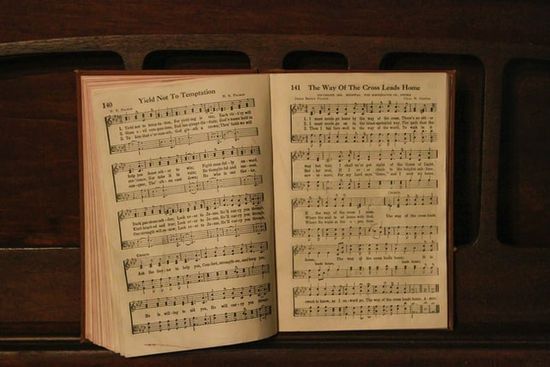The Seventh-day Adventist Hymnal
The Seventh-day Adventist Hymnal is a songbook used worldwide by many Adventist congregations during their worship services. Since its publication in 1985, it has helped foster praise to God while reminding church members of our mission and drawing them closer to Jesus.
Walking into an Adventist Church, you might notice people singing from these hardcover books during song service—a time of singing praise to God in the church’s main program. The words may be on a screen at the front of the church too.
Even while visiting the homes of Adventists, you may spot a hymnal on a bookshelf or piano.
Since it’s likely you’ll run into this book at some point, now is a great time to get acquainted with it. We’ll give you an overview:
- Where can you find an Adventist hymnal?
- What is the Seventh-day Adventist Hymnal?
- What is the history of the Adventist hymnal?
Let’s jump in.
Where to find an Adventist hymnal today

Photo by CHUTTERSNAP on Unsplash
Adventist hymnals are not hard to find! Just check the little shelf or pocket behind the pew at your local Adventist Church. You’re almost guaranteed to find one there, alongside some Bibles and maybe some other song books as well.
But if not, the good news is that there are many free Adventist hymnal apps for your smartphone. Download one and you’ll be all set.
- Adventist hymnal songs on YouTube
- Android Apps of the Adventist hymnal
- Apple iSO Apps of the Adventist hymnal
- PDF of Adventist hymnal
You can also obtain a physical copy of the hymnal at your local Adventist Book Center or on their website.
To experience some Adventist hymn singing, visit a church in your area or watch its live-streamed church service.
What is the Seventh-day Adventist Hymnal?

Photo by Stefany Andrade on Unsplash
A hymnal is a collection of songs, or hymns, used in religious services. Thus, the Seventh-day Adventist Hymnal contains songs used for Adventist worship services.
A hymn is different from other songs in that it’s used in the context of worship and often expresses praise to God. Today, people associate the word with a traditional style of music, accompanied by piano or organ, or sometimes guitar.
(Please note: This doesn’t mean that singing hymns is somehow holier. Instead, it is a music preference among other styles of music that honor God.)
You’ll likely find that many Adventist churches choose to sing hymns because of the richness they offer in expression, reverence, and poetic lyrics. They can:
- create an atmosphere of praise and worship
- help us focus on Jesus
- remind us of our beliefs and strengthen our faith
- inspire us in our mission to share the goodness of God, and prepare for His return
So let’s get better acquainted with what’s inside the covers of this book.
Overview of the Seventh-day Adventist Hymnal
This compilation of songs is organized by theme and consists of two main sections. The first and largest consists of hymns—695 total! The second section has Scripture readings for worship services.
The hymn section is organized by categories, which are listed in the Table of Contents at the front of the hymnal. These categories are:
- Worship
- Trinity
- God the Father
- Jesus Christ
- Holy Spirit
- Holy Scriptures
- Gospel
- Christian Church
- Doctrines
- Early Advent
- Christian Life
- Christian Home
The back of the hymnal has some useful tools too. It includes
- An index that organizes hymns by topic
- A Scriptural index, which lists Bible passages and the hymns based on those passages
- An index of hymns that would appeal to children
- Songwriter and composer indexes
- A hymn tune index
- A metrical index, which lists songs by the number of syllables in each line of music
- A general index, which lists songs by their titles or first lines
We’ll turn our attention to a page of the hymnal next.
Looking at a page of the hymnal

Photo by Michael Maasen on Unsplash
In its formatting, the Adventist hymnal is not much different than the hymnals of other Christian denominations. When you open to a hymn, you’ll find its number in the upper right corner. People use these numbers to communicate which hymns will be sung, since it’s shorter than their titles and so the reader can find it easily.
Then, you’ll notice the musical notation with the words of the hymn in the middle (unless the hymnal is an edition with text only). This takes up most of the page and is what singers and musicians use.
The musical notation is not specifically for musicians, however. Instead, it is written for choral singing, in which people sing in four parts—the melody and three parts of harmony.
But don’t worry—you don’t have to know how to do that! Most people just sing the main tune, or just follow the lyrics.
On the left, above the musical notation, you’ll see a name. That’s the songwriter.
On the right side, you’ll see a couple of names—the top one is the name of the tune and the bottom one is the name of the tune’s composer, since sometimes the composer is different than the person who wrote the words.
The hymns
The Adventist hymnal contains a diversity of hymns by both Adventist and non-Adventist hymn writers. Many well-loved hymns of the Adventist church are also cherished across denominations. Think “Amazing Grace,” “How Great Thou Art,” or “Jesus Paid It All.”
Here are a few of the well-known songwriters and composers whose hymns are in the Adventist hymnal, and one of their most well-known hymns:
- Fanny Crosby (“Blessed Assurance”)
- Ira D. Sankey (“Under His Wings”)
- Isaac Watts (“I Sing the Mighty Power of God”; “At the Cross”)
- Charles Wesley (“Hark the Herald Angels Sing”)
- Philip Bliss (wrote the music for “It Is Well”)
- Lowell Mason (“Joy to the World”)
See if you recognize any of the hymns in the sidebar.
Well Known Adventist Hymns
Amazing Grace
How Great Thou Art
It Is Well
Great Is Thy Faithfulness
Holy, Holy, Holy
Be Thou My Vision
Blessed Assurance
Jesus Paid It All
A Mighty Fortress
Come Thou Fount
What a Friend We Have in Jesus
At the Cross
Turn Your Eyes Upon Jesus
To God Be the Glory
Crown Him with Many Crowns
Praise God from Whom All Blessings Flow
What makes the Adventist hymnal unique?
The Adventist hymnal is unique because many of its hymns emphasize the biblical truths that have been pivotal in the Adventist Church since its beginnings. Truths such as Jesus’ second coming, the judgment, the sanctuary, the worldwide mission, and the Sabbath.
Two songs that emphasize the judgment are, “Cover with His Life” and “The Judgment Has Set,” which were written by an Adventist songwriter and composer, F. E. Belden.
Songs about the Sabbath include, “Crowning Jewel of Creation” and “Don’t Forget the Sabbath.”
One hymn that emphasizes our prophetic heritage is, “Look for the Waymarks.” This hymn follows the prophecy of Daniel 2, which shows a statue of different metals, representing consecutive world empires through history to the coming of Christ. The song lists the empires and calls us to see these “waymarks” as indicators of Jesus’ soon return.
Songs that emphasize our doctrines rallied the early Adventists and continue to encourage us in following Jesus today.
What is the history of the Adventist hymnal?
Singing has been an important part of the Adventist Movement from its very beginning. Even before the church was officially organized, its founders published hymnbooks. The current hymnal was compiled by a General Conference committee from 1982 to 1984.
Let’s back up a little, though.
The first Adventist hymnal
James White, one of the church’s founders, published the first hymnal for the church in 1849—over 10 years before the church even had a name. He called his hymnal Hymns for God’s Peculiar People That Keep the Commandments of God and the Faith of Jesus. (Yes, books back then had long titles!)
What kinds of songs did it include?
It had hymns from many of the other denominations, including Methodist and Baptist. It also had songs by Adventists that reflected their mission of preparing for Jesus’ coming.
Four more “official” church hymnals followed before the most current version.1
The 1985 Seventh-day Adventist Hymnal

Photo by Mick Haupt on Unsplash
In 1981, the General Conference chose 19 people for a hymnal committee. Headed by Charles L. Brooks, this group, together with a large advisory committee of 90 people worldwide, would compile a new church hymnal.
The committee surveyed 3,000 pastors about what old hymns they would like to see in the new book. They also studied 100 different hymn books.
They ended up with a list of 3,600 songs that would need to be narrowed down!
Then the work began. From 1982 to 1984, the members put in countless hours at home and met five times for four days at a time. They had to listen to every hymn, evaluate it, and vote on it.
Their criteria?
They asked the following questions2:
- Was the hymn consistent with the Bible and its teachings?
- Would it fit a broad age range and various cultures within the English-speaking world?
- Was it something that people could learn easily and enjoy singing or playing?
The compilers wanted hymns that upheld distinctive Adventist teachings and connected us with Christianity at large. For diversity, they chose some early advent hymns, modern gospel songs, African American spirituals, and folk hymns as well.
After the hymns had been voted on and compiled, the Seventh-day Adventist Hymnal was published in 1985. The General Conference helped promote it.
This version we’re talking about is the standard one used in most English-speaking Adventist churches. It has also been translated into other languages. In addition to the hymnal, some Adventist churches use other songbooks too, including ones made for children.
Adventist hymns can enrich our worship of God
In countless places, the Bible encourages us to “sing to the Lord” or “raise our voices” in praise to Him. Ephesians 5:19 even talks about “hymns and spiritual songs, singing and making melody to the Lord” (ESV). The goal of the Adventist hymnal is to help people do just that. It allows us to use the energizing power of music to unite our hearts in worship to God.
As we sing, the hymns uplift our spirits, remind us of our mission in this world, and help us experience the presence of Jesus.
Yes, singing is only one part of the worship service. But it’s a very meaningful part that draws us to our Savior in ways other things may not. Singing has always been a method for expressing profound concepts and emotions, and songs often mean a lot to the people writing them and to the ones singing them.
Curious to learn more about Adventist Church services? Read our article about visiting an Adventist Church.
Find a Church
If you’re interested in finding a local Adventist church near you, you can use the Adventist Locator provided by the General Conference of Seventh-day Adventists.
- Seventh-day Adventist Hymnal (Hagerstown, MD, Review and Herald, 1985), p. 5. [↵]
- Seventh-day Adventist Hymnal, p. 6; Hooper, Wayne, “The Making of the Seventh-day Adventist Hymnal.” [↵]
More Answers
Do Seventh-Day Adventists Have “Rules” For Clothing?
Many religions have guidelines on dress, but what about the Adventist Church? Discover how Adventists choose to dress based on biblical principles.
11 Reasons People Become Seventh-day Adventists
Curious why many people become Adventists? Here are elements of Adventist beliefs, values, and mission often reflected in people’s decisions to join.
What’s the Seventh-day Adventist General Conference Session?
At the General Conference Session, Adventist delegates from around the world gather to assess the state of the organization, pray, and discuss current issues. Here’s how it works.
How Adventists View the End of the World
The end of the world is no fun to think about. But here’s how we can actually find hope and comfort in what’s to come.
What Is an Adventist Medical Missionary?
A medical missionary in the Adventist Church is someone who cares for the medical needs of people as a way of showing the love of Jesus. They may travel to another country, or even just serve in their hometown.
Is the Seventh-day Adventist Church Protestant?
Learn how the beliefs of the Seventh-day Adventist Church align with the “5 solas” of Protestantism.
Are Seventh-day Adventists Evangelicals?
According to its origins and definition, evangelicalism is about following Jesus and the Bible and sharing the Gospel through the way we live our lives. Adventists wholeheartedly harmonize with these principles.
Could Anything Keep Me from Becoming an Adventist?
We are each saved through Christ. But when it comes to church membership, are there certain beliefs or expectations to become an Adventist?
Do Seventh-day Adventists Have “Rules”?
We uphold principles we believe will help us maintain a closer relationship with Jesus and His Word. Learn how these principles guide Adventist lifestyles.
Do Seventh-day Adventists Have “Rules” For Marriage?
Around the world, many cultures and religions have various marriage traditions, expectations, or even rules when it comes to choosing a partner, planning the wedding, extended family logistics, or a number of other things.
Can a Seventh-day Adventist Marry a Non-Adventist?
Yes. Seventh-day Adventists are not under any official rules that dictate who they can or cannot marry. This is a personal, life-altering decision between the couple and God.
What Adventists Believe About Alcohol and Tobacco Use
The Seventh-day Adventist Church has historically discouraged the use of alcohol and tobacco. Even before the church started in 1863, its leaders were realizing the negative effects of these substances.
Jewelry—Why Do Many Seventh-day Adventists Choose Not to Wear It?
If you walk into a Seventh-day Adventist church service, you might notice that many people aren’t wearing earrings, bracelets, necklaces, or sometimes even wedding rings.
International Pathfinder Camporee
Youth aged 10-15 in the Adventist Church’s global Pathfinder program look forward to the International Camporee every 5 years. This event brings together Pathfinders from around the world for exciting activities.
How Adventists interpret Bible prophecy
Bible prophecy conjures up a variety of emotions in people. For some, it feels exciting or mysterious.
Moviegoers’ Guide to The Hopeful: The Facts Behind the Film
Learn where and when you can watch The Hopeful and how to get tickets. Already seen it? We’ll uncover the real story that inspired this film.
How Are Seventh-day Adventists Different from Other Protestants?
As a Protestant Christian denomination, the Seventh-day Adventist Church regards the Bible as the ultimate guide and looks to Jesus Christ as the only way to salvation. We do have some differences of belief or interpretation when it comes to topics like Bible prophecy, end-time events, the Sabbath, and a person’s state after death.
How Adventists Handle Death and Funerals
Most Seventh-day Adventist funeral services are similar to those of other Protestant denominations, such as Methodists, Baptists, or Presbyterians, but you might find a few differences or unique nuances.
Adventist Culture
Many Seventh-day Adventists adhere to specific lifestyle principles that can make them stand out from those in other Christian denominations. Whether it’s going to church services on Saturday or eating the popular Adventist entrée of “haystacks.”
Do Adventists Observe Easter-Related Holidays?
Jesus Christ’s resurrection, celebrated on many Easter-related holidays, is central to the beliefs of the Seventh-day Adventist Church. And that means we seek every opportunity to remember it.
An Overview of Seventh-day Adventist Higher Education
The Seventh-day Adventist Church has about 118 tertiary schools around the world. Though many of them are within North America, you’ll also find Adventist universities in countries across the world—places like Croatia, Austria, Brazil, Madagascar, and the Philippines.
The Ten Commandments from a Seventh-day Adventist Perspective
Ever eaten a salad and gotten a big piece of green stuck in your teeth? And you didn’t realize it was there until you looked in the mirror? (Because no one ever told you!)
The Benefits of A Seventh-day Adventist Academy
Adventist academies are high schools (grades 9-12) that are owned and operated by the Seventh-day Adventist Church.
Are Seventh-day Adventists Christians?
Yes, the Seventh-day Adventist Church is a Protestant Christian denomination formed in 1863. Just like other Christians, we believe that Jesus Christ is our Savior and seek to follow the principles of the Word of God.
Adventist Movies: Where Faith and Film Meet
The Adventist Church uses film to share our faith and uplift positive values. Learn more about specific Adventist-produced films and where to find them.
Do Adventists Celebrate Christmas?
In general, most Seventh-day Adventists do celebrate Christmas.
Since our denomination doesn’t have specific guidelines about holidays, it’s up to each member to decide whether to celebrate it based on their personal convictions and study of the Bible.
What Does the Bible Say About Modesty
Seventh-day Adventists and Christians in general try to ensure their outward presentation and lifestyle glorify God. This often involves daily habits like the ways we hold conversations, the ways we dress and accessorize, and the ways we regard other people when we’re out and about.
How Do Adventists Make Movie and Music Choices?
How do Adventists decide what music to listen to and which movies to watch? Learn how Bible principles can help us make better entertainment choices.
Does the Seventh-day Adventist Church Believe in Paying Tithe?
Seventh-day Adventists believe in paying tithe and offerings based on the biblical command and our commitment to being wise stewards of God’s resources. These donations help fund the mission of the Adventist Church by supporting pastors, missionaries, church expenses, and evangelistic projects, among other things.
Didn’t find your answer? Ask us!
We understand your concern of having questions but not knowing who to ask—we’ve felt it ourselves. When you’re ready to learn more about Adventists, send us a question! We know a thing or two about Adventists.




























